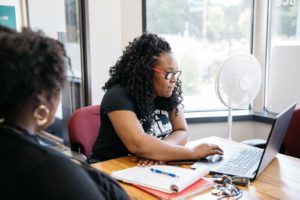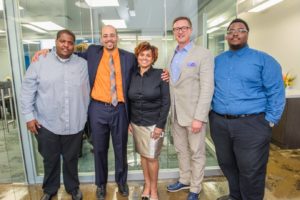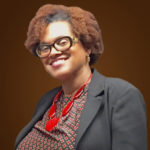Nicole Bien’Aime, co-owner of Voluptuous Bien’Aime in Rosedale Park, found a location for her full-figured ladies’ boutique and an ocean of advice by attending a 20-week entrepreneurial training program offered at Grand River WorkPlace. Her picture window, pop-up store is the buzz of the neighborhood and a jewel in the co-working space on Detroit’s northwest side.
“There’s not a lot of plus-size places in the area, so I’m offering day to night clothes, after-5 wear and trendy things you can’t find anywhere else,” says Bien’Aime.
Along with clothes that serve multiple functions, Bien’Aime and her partner, Chanel Coleman, custom make sneakers with rhinestones, fashion-forward purses, and hats. Bien’Aime moved the business around for several years until she enrolled in a ProsperUS Detroit class at Grand River WorkPlace.
In addition to instructing her in business plan preparation and showing her how to marketing her wares, the course taught her how to make optimum use of the square footage at WorkPlace, a former hair salon-turned-professional co-op building for up to 28 entrepreneurs.
Small business incubators and co-working spaces are popping up all over town, offering tenants low monthly rent, wireless internet, informative workshops, special events and a host of other services. The United States co-working industry, according to JLL, a real estate consulting company, now represents 27 million square feet of office space, and the pipeline of potential only continues to increase. Between 2006 and 2012 co-working centers doubled worldwide, according to a survey by Deskmag.com.

Grand River WorkPlace Manager Larissa Carr says the building, which opened in 2014 with support from its parent organization, Grandmont Rosedale Development Corp., and Detroit Local Initiatives Support Corp., serves members on a first-come, first-served basis. The building attracts freelancers, sales associates, computer professionals and others into a flexible work environment that’s open 24 hours. Tenants pay $75 a month for basic memberships that include access to meeting rooms and use of building resources or $300 a month for reserved, private space. Entrepreneurs have access to WiFi, copy and printing services, a shared conference room and kitchenette, and a bonus – daily encouragement from Carr.
A forerunner of the local co-working space movement is TechTown Detroit, founded in 2000 by Wayne State University, Henry Ford Health System and General Motors. The organization incorporated as a non-profit in 2004 and opened what’s become a buzzing beehive of entrepreneurs at 440 Burroughs, north of Wayne State’s campus. For example, tenant and MILO Detroit owner Billy Strawter leads a full-service, digital marketing agency from TechTown.
 “TechTown has been instrumental in the growth of my business,” says Strawter. “TechTown is a hub with lots of events, bringing in various people from multiple industries. They offer quite a bit of programming from social media to legal and everything in between.”
“TechTown has been instrumental in the growth of my business,” says Strawter. “TechTown is a hub with lots of events, bringing in various people from multiple industries. They offer quite a bit of programming from social media to legal and everything in between.”
Apart from programming, proponents says common work space provides the right atmosphere.
“The whole appeal of co-working spaces is fast internet and a fabulous community,” says Karen Burton, who runs SpaceLab, which recently opened on the seventh floor of an office building on Shelby Street in the shadow of Cobo Center. “I understand the need for ‘solo-preneurs’ and small businesses to be able to collaborate and share resources.”

SpaceLab includes room for 35 companies, use of video conferencing, onsite printing, a design library, conference rooms and a project display area at a rate of $40 monthly for introductory membership. A full office suite is available for $2,000 per month.
Bryan Cook, Detroit’s director of Berardi and Partners, an Ohio-based architectural firm, talked his clients into renting a six-unit office at SpaceLab instead of building an office or buying a building. The option to choose a short-term lease agreement is enticing, he says, because his firm isn’t tied to the traditional three to five years, while growing its clientele.

“We could just walk in, bring our computers and start working,” says Cook. “The opportunities for conversations and idea generation are unlimited.”
Burton, an architect with a degree from University of Michigan, got some help making SpaceLab accessible to many businesses in the midst of pricier downtown office buildings with a $55,000 Motor City Match grant. The funding helped build square footage into an enviable space for entrepreneurs.
“This is a dream come true,” she says.
In the east side’s Jefferson-Chalmers area Alex R. Thomas and partner Venetia S. Lyons opened Thinkers Co-Working Spaces six months ago. Now they have about 10 clients, “enough to smile about,” says Thomas, who started as an entertainment industry publisher of Promoter magazine and puts his skills to good use.

Thinkers sponsored a Small Business Administration challenge for women entrepreneurs giving the top award to Rejuvenations Shoes LLC. The company also hosts open mic poetry slams, local writers’ networking meetings, wine and cheese gatherings, and even fundraising for special causes. Thinkers Tenants include Dr. Leron L. Lightfoot, who runs Math 4 Success for the Youth, and filmmaker Dylan Sides.
Co-working spaces are also a boon for landlords whose properties once lingered when the push to the suburbs left Detroit behind. With the ongoing rebound of interest in building stock, space is at a premium.

“Roger Basmajian, owner of our building, wants to keep it creative with web developers, marketing companies and architects who contribute to the spirit of Detroit,” says SpaceLab’s Burton.
Editor’s Note: To learn more about Bank of America’s many programs and resources for small business owners visit: https://www.bankofamerica.com/smallbusiness/business-financing.go


